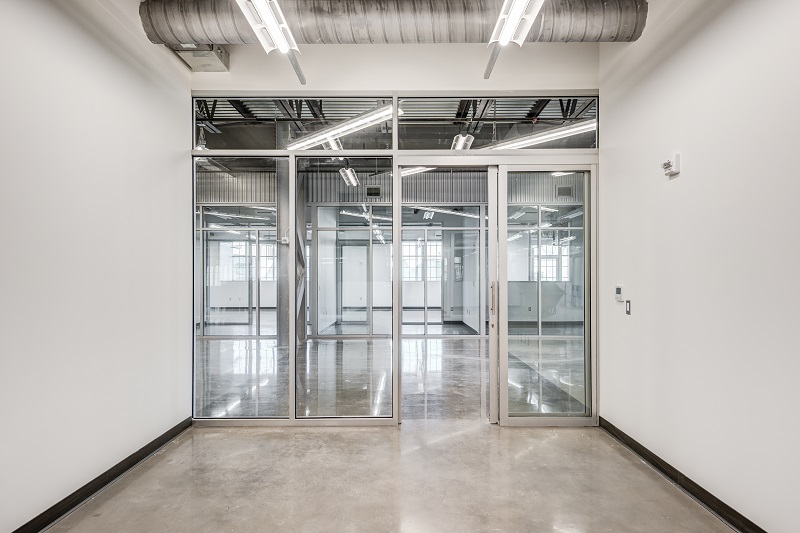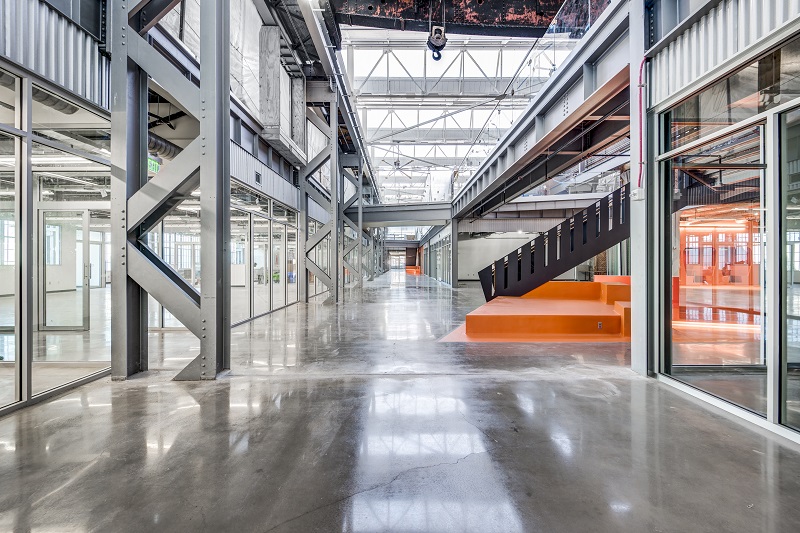Hugo Neu Corp. recently completed The Annex, a restored industrial building that contains 90,000 square feet of private office suites for small and medium-sized businesses. The building is the latest addition to the firm’s high-profile, 130-acre redevelopment project known as Kearny Point. — Courtesy: Hugo Neu Corp.
By Joshua Burd
Hugo Neu Corp. has preached flexibility since the earliest days of Kearny Point, its growing business center at the site of a former shipbuilding complex in Hudson County.
That strategy has become all the more important in recent months.
The developer, which caters largely to entrepreneurs and small businesses, has unveiled a new offering at the 130-acre campus with the completion of The Annex, a collection of about 200 private offices across 90,000 square feet. The building now serves as an attractive option for tenants in the wake of the coronavirus crisis, providing an alternative to the crowded, collaborative spaces that run counter to social distancing guidelines.
Those tenants include businesses that were already at Kearny Point — which Hugo Neu has allowed to relocate from an existing co-working space to individual suites within The Annex.

“From our viewpoint, what we see is people coming out of co-working environments who just don’t feel safe there, mainly because companies … don’t want to walk into an office and share that office with employees of other companies,” said Steve Nislick, Hugo Neu’s chief financial officer. “So they want their lock, their key. They want to know that, within their space, they control that space — whether it’s 120,000 square feet or 10,000 square feet.”
The landlord has become well-versed in smaller, private offices since it began to redevelop Kearny Point, which sits just south of Route 1 and 9 between Newark and Jersey City. The first piece of the project, a rehabilitated, 207,000-square-foot structure known as Building 78, opened in 2016 and is home to more than 200 small businesses, most of them in private office and flex units, along with a co-working space and a host of shared amenities.
With the addition of The Annex, Kearny Point was set to have yet another infusion of space for small to medium-sized users, offering private offices starting at 100 square feet. But it was clear by early March that Hugo Neu would have to pivot. After closing its own headquarters at the site, the firm reduced access to the campus from 24 hours a day to 6 a.m. to 7 p.m. Monday through Friday, seeking to ensure that it could properly clean and monitor the property.
The company also closed common areas and conference spaces within Building 78 in order to prevent mingling. By mid-March, the firm had stopped marketing its co-working space and instead turned all of its attention to its private offices.
“We’ve had multiple queries and interest from other co-working spaces and new customers in general for strictly private offices, because the thought of being in an open, co-working shared space just isn’t feasible now,” said Nick Shears, Kearny Point’s director of leasing.

The developer began to transition co-working tenants into The Annex in early May, a process that would take up much of the building’s first floor. Fortunately, there were still about 80 private offices remaining that Hugo Neu has been marketing on the second floor, which was slated to be complete around July 15, to help meet what it says is robust demand for such space.
The early results are encouraging. By early July, the firm had closed three deals totaling 1,200 square feet, with another six deals in contract totaling 10,000 square feet. All of them involved northern New Jersey-based tenants, Hugo Neu said, noting that total leads in June were triple the number it saw in April and May.

“When they see our pictures online, they see that there’s wide elevators and there’s multiple staircases to use,” Shears said. “And the fact that we’re advertising private offices, it’s getting across to people in primarily North Jersey, some Central Jersey and also some New York companies.”
Hugo Neu is offering those options alongside other benefits — flexibility and ease of use — which are increasingly vital during a pandemic. Nislick said the firm intends to offer more furnished offices and allow tenants to sign short-term leases, even for larger spaces, as they attempt to work through the current economic uncertainty.
He believes that approach will appeal to a range of users.
“It could be a New York company looking for a space to locate their New Jersey employees who are getting tired of working from home and rotating those employees in and out of space,” he said. “We see demand growing for that type of product.”
Hugo Neu sought to maximize its flexibility with The Annex, which adjoins Building 78 and has tenants as large as 8,000 square feet. But the firm noted that even those spaces are part of a common grid within the building that can be easily subdivided.
“That was a new concept that we came up with when we designed The Annex, but fortunately for us, that concept works for this new post-COVID (period),” Nislick said. “But we’re tremendous believers in lots of small tenants, lots of different-sized spaces so a tenant can start out with a small office … and they can continue to grow within the building.”
As of early June, Hugo Neu was making modifications to the so-called hot desk area within the co-working space in order to market it to a larger company, Shears said. The space comprises 10,000 square feet that is divisible into 5,000-square-foot units, ensuring that it would be restricted to one or two individual users.
That’s not to say that co-working is doomed forever, according to Nislick. But he said its future will be as a business that is operated by landlords, as he believes it’s too volatile for tenants.
In the meantime, Hugo Neu remains bullish as ever on private offices, an offering that that will only become more attractive once it can safely reopen the common spaces at Kearny Point.
“Our business is not co-working,” Nislick said. “It’s private flex space, private offices with a community environment. And to be honest with you, in New Jersey, I think that’s the best product. I don’t think New Jersey is a big lover of intense co-working, and you can accomplish the same thing and create a similar environment with private offices of different sizes and you offer the tenants a lot more flexibility. I think we’ve demonstrated that.”










